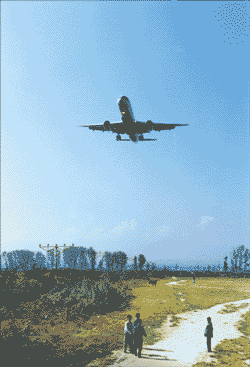 A high-level committee to look into the rot at Royal Nepal Airlines has just submitted its report. There is bad news and worse news. The bad news is that the airline is losing Rs 200 million a year and is on the verge of collapse. Worse news: the government has no more money to bail it out.
A high-level committee to look into the rot at Royal Nepal Airlines has just submitted its report. There is bad news and worse news. The bad news is that the airline is losing Rs 200 million a year and is on the verge of collapse. Worse news: the government has no more money to bail it out.
Royal Nepal Airlines has always been a barometer for the state of the nation, so it is no great surprise that a perfectly good airline has in the past 12 years been brought down to its knees through political interference, mismanagement and corruption. That in a nutshell is also the high-level committee's findings, and in that sense it is nothing new. But the report has sent a clear message to the government that it better divest, and fast.
"There has been just too much political interference, it has problems with ownership and there is widespread mismanagement," says Narayan Singh Pun, member of parliament and member of the committee. "Reorganising it as a company and inviting private partners is the only way to change all that."
Royal Nepal Airlines has not had an audit since 1998, but you don't need an auditor to hear the stall warnings going off. Senior executives at the airlines tell you privately they have never seen it so bad: losses averaging Rs 500,000 a day, incredible tales of loot, political intervention, and corruption. Palms are greased every time the airline has hired jets, sent engines for overhauling, or appointed sales agents.
"Privatise RNAC?" asks one disgusted employee sarcastically, "this is already a private airline of politicians." The most glaring example of graft was the hiring of a General Sales Agent for Europe in 1995 under pressure from politicians which caused the airline losses worth nearly Rs 400 million.
These and other anomalies are emerging as auditors try to finish off with a backlog in book-keeping. Insiders tell us the official losses to the airlines due to politically-motivated decisions adds up to over Rs 1 billion. "And we are not even talking about kickbacks," one senior executive told us. The airline's loans and disputed liabilities add up to another Rs 2.6 billion.
If the airline goes belly up, which is now a distinct possibility if action is taken quickly, then these liabilities need to be picked up by the government. The tourism ministry which handles Royal Nepal Airlines knows it's got a hot potato in its hands. Joint secretary Nagendra P Ghimire told us: "We have very few options left. We have a plan, we are serious about putting it into action."
This plan, which is awaiting cabinet endorsement, is for the government to divest a part of its share to a strategic partner and overhaul management. But that will take at least a year.
The government needs to immediately inject Rs 2 billion to keep the airline flying. Not only does it not have that kind of money, but, given the level of mismanagement and corruption within the airline many fear the money could just disappear without result.
The high-level committee recommends that the government should give up one-third of its shares to an appropriate foreign airline, retain a portion, sell the rest to private tourism entrepreneurs, banks, staff and the general public. A government source told us: "We are now so frantic we may even agree to give more than one-third control to a strategic partner."
That would be a Sri Lankan Airlines type of solution: government sells 49 percent of its share to a major international airline (Emirates in the case of Sri Lankan) and hands over full managerial control and autonomy, including personnel. The last part would be difficult for the government which has used Royal Nepal Airlines as an employment agency for party activists.
The cabinet may find it difficult to endorse privatisation because the airline has been a cash cow for political slush funds. A decision to divest control would therefore be a test of Prime Minister Sher Bahadur Deuba's commitment to root out corruption. Tourism minister Bal Bahadur KC kept a post-democracy tradition of replacing the airline's chief executive and directors with cronies as soon as he became minister. The airline has had 17 CEOs and its directors have been shuffled 23 times since 1990.
There are silver linings: despite the huge liabilities the airline has assets worth up to Rs 7 billion with its two 757s, seven Twin Otters, equipment, real estate and buildings. With a proper management and less political meddling the airline could be turned around relatively rapidly. The other sign of hope is that during his first term as prime minister, Deuba had actually come close to approving the airline's privatisation. He was toppled just days before the decision.
But not everyone in the airline is optimistic that even the divestment will be handled honestly. The reason, as one senior manager told us: "This airline is run by remote control from Singha Darbar."


